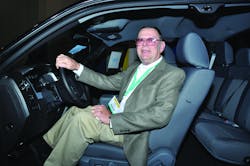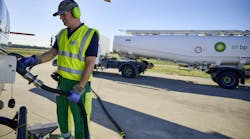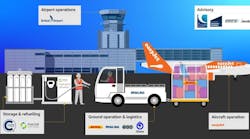LAS VEGAS -- The newly formulated Cygnus Aviation Expo, the former Aviation Industry Expo, again aligned with the Spring Training Week hosted by the National Air Transportation Association here in late February. The show included 227 exhibitors and delegates from airlines, fixed base operations and repair stations, and ground support personnel.
Following is a quick recap of highlights from sessions held at the Expo ...
• Alternative Technology for GSE: Fuel Cells for the Future? (Speakers: Lennie Klebanoff, director, Sandia National Laboratory; Greg Moreland, Department of Energy)
The seminar focused on developments in fuel cell technology, and options for a sustainable introduction of this technology into ground support operations. The technology includes use of fuel cells as a power source for ground equipment as well as use as a backup power source in emergency situations. Klebanoff sees fuel cells as one of the more viable options for the industry as carbon reduction standards combine with rising fuel prices to necessitate alternative fuel operations. Moreland focused on the advances in fuel hydrogen production through more sustainable methods, including the conversion of decomposition gasses.
• Electric GSE (Speakers: Wayne Alexander, Electric Blue Auto Conversions; Ryan Gibson, GSE general manager, AeroVironment)
The integration of electric into existing diesel fleets and effective uses of electric systems are a growing focus in industry. Alexander cautions about the difficulties inherent in first-time conversions of new systems.
Gibson relates that as batteries are becoming more advanced, their charge speed and duration improves, along with their cycle life, reducing the replacement costs that plagued older batteries.
• VALE Funding (Speakers: Calvin Davenger, deputy director of aviation, PHL; Bruce Miller, PHL-Properties/facilities, US Airways)
VALE, the Voluntary Airport Low Emissions program, offers grants to airports for a variety of green projects. Davenger relates that although these funds are commonly focused on the implementation of electric infrastructure, he points out that grants can be applied to other alternative fuel systems as well, so long as the positive environmental impact is sufficient.
• Human Factors on the Ramp (Speaker: Dr. Bill Johnson, , FAA)
Dr. Johnson focuses on awareness of personnel characteristics and task requirements to set up a work environment that is conducive to safety. This includes various ways to improve staff’s fitness for duty, including scheduling restrictions to avoid fatigue and periodic observation periods. Johnson says that through improved work conditions and a greater awareness of workers’ needs and abilities, the incidents of human error can be greatly reduced.
• Deicing Operations and the Environment (Speaker: Tim Pohle, environmental affairs, ATA)
With a focus on new EPA regulation of deicing operations’ runoff and glycol recovery requirements, Pohle discussed the proposed three-tiered approach to regulation, and the requirements of each tier’s mandates. In the top tier, there will be a requirement for 60 percent of expended glycol to be collected, stored, and treated. The middle tier would be required to collect 20 percent, and the lowest would be immune from collection requirements, but cease the use of urea treatment fluid.





